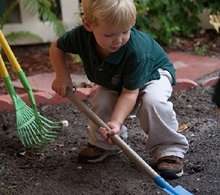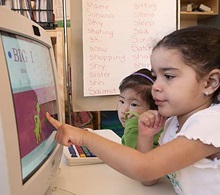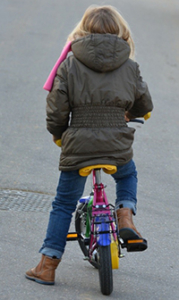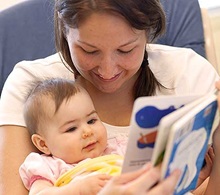 From infancy, humans seem to be on a quest for independence. Babies insist on holding a bottle or picking up food themselves. Toddlers emphatically announce, “Me do it.” The preschool years are a time of burgeoning independence as children gain the intellectual, verbal, and social-emotional skills to tackle more tasks independently.
From infancy, humans seem to be on a quest for independence. Babies insist on holding a bottle or picking up food themselves. Toddlers emphatically announce, “Me do it.” The preschool years are a time of burgeoning independence as children gain the intellectual, verbal, and social-emotional skills to tackle more tasks independently.
But how do you balance your child’s desire for independence with his need for safety and limits? This issue is one that doesn’t go away as your child gets older, but continues to emerge. Think of sleepovers, extracurricular activities, teen dating, sports, and perhaps the scariest of all – handing over the car keys to your teen driver. The communication and relationship style you develop when your child is a preschooler will continue to inform your parenting for many years to come. Here are a few ideas to navigate the journey to independence with your child.
Tips to Help Preschool Children Develop Independence
- Pick your battles. If you find yourself butting heads with your preschooler, ask yourself, “Will this matter a year from now?” In many cases, it’s okay – and even desirable – to let your preschooler make decisions. Parents always get the final say in matters of safety, health, and well-being, but your preschooler can help make many small decisions, such as which book to read at story time or which movie to watch at family movie night.
- Offer choices. One of the simplest ways to foster independence and help develop critical thinking skills in toddlers and preschoolers is by offering choices you both can live with. For example, many children love to choose what they’ll wear each day, but still need a little guidance to make appropriate choices. Let your child pick her clothing, but set some boundaries, e.g., “It’s cold outside so you need to wear pants or leggings.”
- Provide flexibility within structure. Predictability and consistency help children feel safe, but rigidity can cause them to bristle. Maintain a schedule and let your child know what to expect. At the same time, be willing to make changes when necessary. For example, perhaps you have a rule that you eat dinner as a family with no television or devices on. This is a perfectly reasonable rule, but there’s room for flexibility too. It’s okay to move dinner back 15 minutes to let your child finish watching a favorite television program. These small gestures build a spirit of good will and cooperation within your family.
- Support growth. Early childhood theorist, Lev Vygotsky, favored an approach of “scaffolding” children’s growth to teach new skills. He suggested observing children to understand what skills they had already mastered, then working directly with them to learn a new, slightly more difficult skill. Perhaps your preschooler can put on his shirt and pants, but hasn’t learned to put on shoes and socks. Encourage your child to learn these skills and practice together for several days. Soon your child will develop the new skill independently.
- Set up the environment for success. How your home is organized can make a big difference in your child’s independence. Organize your home so your child knows where everything goes. Shoes and coat go in the mudroom, for instance. Toys go in marked bins in the playroom or bedroom. In the kitchen, keep plastic dishware down low and teach your child how to get a simple snack or cup of water.
Think about the experience of parenting as slowly releasing responsibility over time, starting when your child is in preschool. Your child should learn from an early age that you are her best advocate and cheerleader. At the same time, it’s your job to keep her safe and healthy by setting reasonable limits. Mutual respect, understanding, and cooperation guide every interaction.

 Smart phones, laptops and tablets, oh my! We love all sorts of technologies ourselves but worry about the effect of too much technology on our children. According to a study by Common Sense Media in 2013, the total
Smart phones, laptops and tablets, oh my! We love all sorts of technologies ourselves but worry about the effect of too much technology on our children. According to a study by Common Sense Media in 2013, the total  One day you’re bringing your new little bundle of joy home from the hospital, the next day they’re off to kindergarten and the day after that they are off to college. Ok, it’s not QUITE that fast but you get the idea – time flies when you’re having fun. Because it won’t be long until your baby is heading to college it’s important that you start saving for that time now. In fact, if you haven’t started planning, preparing and saving by the time your child enters kindergarten, you’re just about five years behind the eight ball.
One day you’re bringing your new little bundle of joy home from the hospital, the next day they’re off to kindergarten and the day after that they are off to college. Ok, it’s not QUITE that fast but you get the idea – time flies when you’re having fun. Because it won’t be long until your baby is heading to college it’s important that you start saving for that time now. In fact, if you haven’t started planning, preparing and saving by the time your child enters kindergarten, you’re just about five years behind the eight ball. With bicycling listed as the second most popular outdoor activity in the US, it only makes sense that sometime in the possibly not-so-distant future you will be looking for a new bike for your child.
With bicycling listed as the second most popular outdoor activity in the US, it only makes sense that sometime in the possibly not-so-distant future you will be looking for a new bike for your child. We face many challenges as parents, but toilet training may feel like one of the more daunting ones. And now that your child seems old enough to begin potty training, you also wonder how potty training works in child care. Relax. Like every other aspect of child care, you and your child’s teacher will work as partners in the process of potty learning. Potty training while in a child care or daycare setting may be easier than it is at home.
We face many challenges as parents, but toilet training may feel like one of the more daunting ones. And now that your child seems old enough to begin potty training, you also wonder how potty training works in child care. Relax. Like every other aspect of child care, you and your child’s teacher will work as partners in the process of potty learning. Potty training while in a child care or daycare setting may be easier than it is at home. Your child isn’t going to become a great reader over night, but it can happen one book at a time. But what is the best way for you to choose the right book for your child to read?
Your child isn’t going to become a great reader over night, but it can happen one book at a time. But what is the best way for you to choose the right book for your child to read?